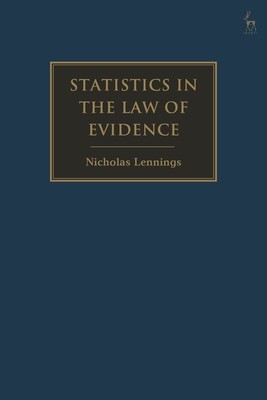
- We will send in 10–14 business days.
- Author: Nicholas Lennings
- Publisher: Hart Publishing
- ISBN-10: 1509957332
- ISBN-13: 9781509957330
- Format: 15.6 x 23.4 x 1.6 cm, hardcover
- Language: English
- SAVE -10% with code: EXTRA
Reviews
Description
This book evaluates the role played by statistical evidence in litigation. Despite the increasing prevalence of statistical evidence in modern litigation, how such evidence should be admitted and used by courts is often inconsistent and widely criticised. Accepting that statistical evidence can lead to more accurate decisions, the book proposes criteria that could allow courts to decide that statistical evidence is good for fact-finding.
The many and varied scholarly debates regarding statistical evidence have by and large avoided judicial attention. Unlike previous works, this book contextualises those debates in the language and practice of evidence law, focusing on Australia, the UK and the USA, and drawing on examples from other common law countries. It does so by identifying that the controversy around statistical evidence follows the three-tired statistical syllogism underlying statistical inference: first, whether statistical evidence is capable of establishing an association between phenomena in a state of nature, second, that phenomena from the general association to an individual, and third, whether statistical evidence can be sufficient for proof of contested facts. Objections are said to arise at each level of the syllogism and, by mapping these objections onto evidence law, the book argues that a pathway for the judicial evaluation of statistical evidence can be constructed.EXTRA 10 % discount with code: EXTRA
The promotion ends in 20d.20:48:20
The discount code is valid when purchasing from 10 €. Discounts do not stack.
- Author: Nicholas Lennings
- Publisher: Hart Publishing
- ISBN-10: 1509957332
- ISBN-13: 9781509957330
- Format: 15.6 x 23.4 x 1.6 cm, hardcover
- Language: English English
This book evaluates the role played by statistical evidence in litigation. Despite the increasing prevalence of statistical evidence in modern litigation, how such evidence should be admitted and used by courts is often inconsistent and widely criticised. Accepting that statistical evidence can lead to more accurate decisions, the book proposes criteria that could allow courts to decide that statistical evidence is good for fact-finding.
The many and varied scholarly debates regarding statistical evidence have by and large avoided judicial attention. Unlike previous works, this book contextualises those debates in the language and practice of evidence law, focusing on Australia, the UK and the USA, and drawing on examples from other common law countries. It does so by identifying that the controversy around statistical evidence follows the three-tired statistical syllogism underlying statistical inference: first, whether statistical evidence is capable of establishing an association between phenomena in a state of nature, second, that phenomena from the general association to an individual, and third, whether statistical evidence can be sufficient for proof of contested facts. Objections are said to arise at each level of the syllogism and, by mapping these objections onto evidence law, the book argues that a pathway for the judicial evaluation of statistical evidence can be constructed.

Reviews